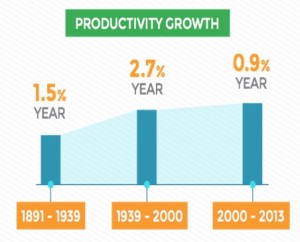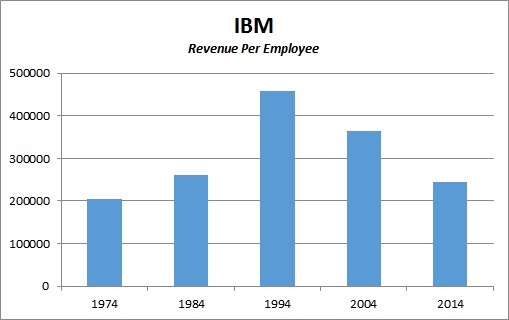Does your mobile phone provide better quality than a typical webcam? I'll test some virtual webcam software for mobile.
The UC winner will be the most productive one
Have all of these new technology tools increased employee productivity? According to Robert Gordon, economist at Northwestern University, the answer has been a big fat no. The chart (left) illustrates the rate of productivity over the last 120 years and this Economist article has more detail. Mr. Gordon argues that the advent of the web and smart phones have not increased worker productivity BUT in fact may have caused a decrease (covered in this 2002 report). Another well known economist, Robert Solow, started this brew-ha-ha with his now famous quote from 1987.
“You can see the computer age everywhere but in the productivity statistics. – Robert Solow”
Not surprising, not all economists agree with Mr. Gordon/Solow arguing that we’ve had some pretty big technology hits that have impacted worker productivity in the last 100 years but fewer in the last 15-20 years. These big early hits overshadow the continued (though smaller) gains we are making. How can you compare the increased productivity of electricity or air conditioning against say a smart phone? Others argue that technology enhancements take years before their positive impact is felt. For example, the early introduction of electricity initially did little as steam and water powered factories didn’t immediately move to electricity.
Productivity in the business world has a simple definition, how do I get more out without putting more in. You can apply this with people as well, namely how can I get more tangible work out each employee.
IBM, a center piece of the technology world publishes a wealth of statistics on their business, the chart below illustrates the revenue per employee in 10 years increments over the last 40 years.
Now you’ll immediately argue that IBM has been transforming their business from hardware & software to one of professional services, hence they have and need more employees per revenue dollar. You’d be 100% correct. But admit it, I got you thinking. Note: Google’s revenue per employee is a staggering $1.2m per employee.
Either way you figure it,
productivity increases have sharply declined since 2000.
Do you remember the 1979/1983 introduction of Visicalc and Lotus 1-2-3 spreadsheets. This was a massive productivity enhancer for many businesses. Spreadsheets were quickly branded as “killer” applications and for good reason, they found their way into all corners of a business and it was easy to see, they enhanced productivity. In fact, spreadsheet applications had a big hand in driving the adoption of personal computers.
Today we have an onslaught of free Internet business tools which reduce the theoretical cost of trying them to zero. Any employee can find them an simply start using them; with a bit of luck, you arrive at work one day to find your entire company magically using these tools.
But are they adding to worker productivity? I have Google Drive, Dropbox, Box.net installed on my computer (Cubby tried to install). Do I really need 3 different programs that effectively do the same thing? (though no doubt each company would argue with me how different they are). How do all these choices and tools impact productivity?
OK, so what about Unified Communications?
Unified Communications was a term coined by traditional PBX providers and perhaps that’s not the correct term for today. But the collision of all of our communications is likely to create a large opportunity for some, numerous niche opportunities for others and some boo-hoo for those who get caught in between playing theaters. We are perhaps on the verge of a quasar moment.
I have belief that employees actually want to be more productivity (I’m first in line on any opportunity to do less), however the current candy store of free apps has us all on a mighty sugar buzz and one that is probably zapping our productivity. Hopefully we will shake this off and focus on those applications that actually render us value.
Despite all the communications tools we have at our disposal, no one would say they’re terribly efficient and thus we have a lot of head nodding. There’s a problem that needs solving. Employees eager to simplify their work day and employers eager to get more work done. Let’s hope some tools emerge to impact this.

